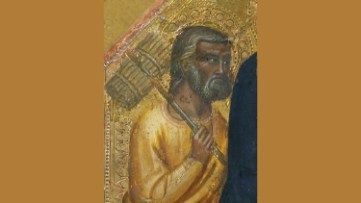St Joseph the Worker, Spouse of the Blessed Virgin Mary, Patron of Workers

In addition to being the spouse of the Blessed Virgin Mary, and the foster-father of Jesus, St Joseph was a carpenter. Through his work of manual labour, Joseph provided for the Holy Family, and shared in the divine plan of salvation.
Joseph, the “Just Man”
The Gospel of St Matthew describes Joseph as a “just man”, which in the language of the Bible means one who loves and respects the law as the expression of the will of God. Like Mary, Joseph too was visited by an angel, who appeared to him in a dream. And, again like Mary, her spouse, Joseph said “Yes”, when the angel revealed that the Child she bore was conceived of the Holy Spirit.
The special characteristic of Joseph is hiddenness, remaining in the background. No word of his is recorded in the Gospels. He is not mentioned after the finding of Christ in the Temple. Probably by the time Jesus began his public life, at the wedding in Cana, Joseph had already passed to the next life, although we don’t know exactly when or where he died. And the place of his burial remains a mystery.
Work: Participation in the Divine Plan
As is true of many fathers, Joseph raised Jesus to follow in his own profession as a craftsman; in the Gospels, Jesus is called “the son of the carpenter”.
The life of St Joseph shows us the dignity of human work, which is the duty and the perfection of human beings, who in this way exercise dominion over creation, share in the work of the Creator, offer their service to the community, and participate in God’s plan of salvation. Joseph loved his work. He never complained of weariness, but as a man of faith elevated it to the exercise of virtue. He found contentment in his work, because he did not aspire to wealth and did not envy the rich; for Joseph, work was not a means to satisfy his own greed, but an instrument to support his family.
And, following God’s commandment, on the Sabbath St Joseph observed the weekly rest and took part in the celebrations. We should not wonder at this noble conception of the humble work of manual labour: already in the Old Testament, in fact, God was seen symbolically as a winegrower, a sower, a shepherd.
The feast of Saint Joseph the Worker
This feast was officially instituted by Pope Pius XII on 1 May 1955, in order to ensure that workers not lose this Christian understanding of work; but earlier Popes had already prepared the ground. Blessed Pius IX in a certain way had recognized the importance of Saint Joseph as a labourer, when he proclaimed him Patron of the Universal Church. The principle of work as a means to eternal salvation would be taken up again by St John Paul II in his encyclical Laborem exercens, where he refers to “the Gospel of Work”. And Cardinal Angelo Roncalli – who became Pope St John XXIII – when he was elected to the Throne of Peter had thought of taking the name Joseph, so devoted was he to the saint who was the foster-father of Jesus. Many other saints, especially St Teresa of Avila, had a particular devotion to Saint Joseph.







